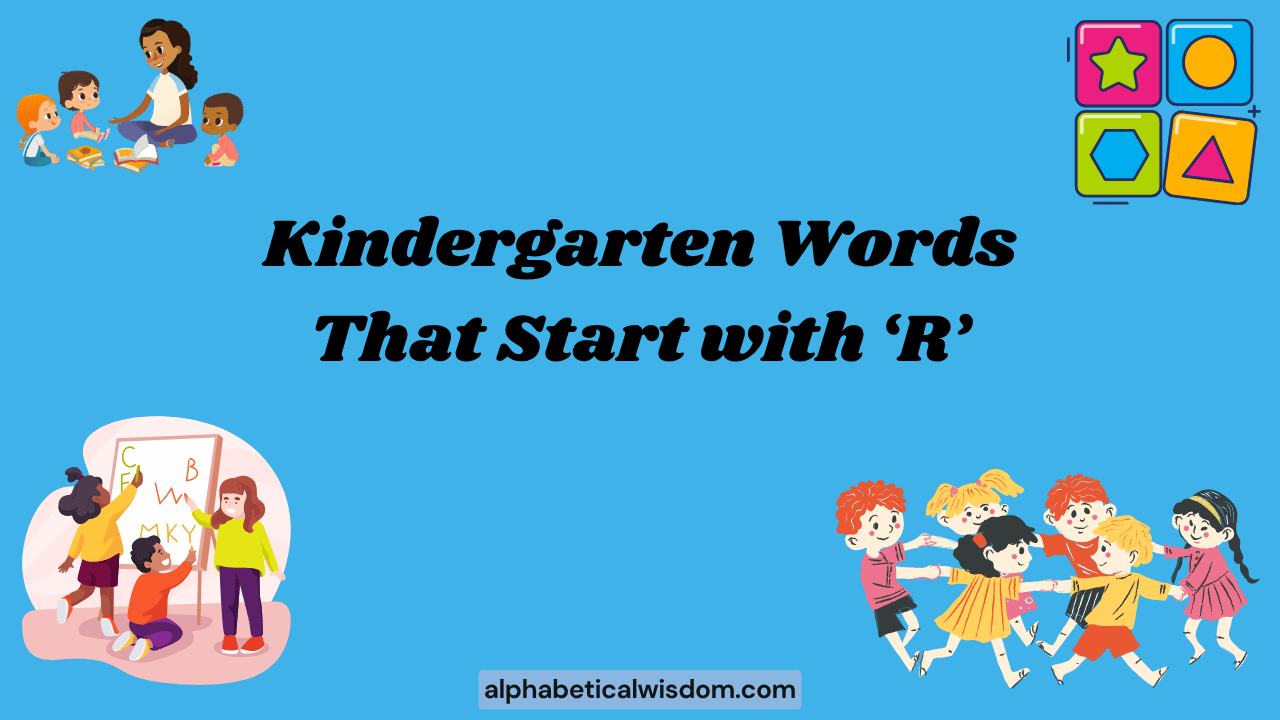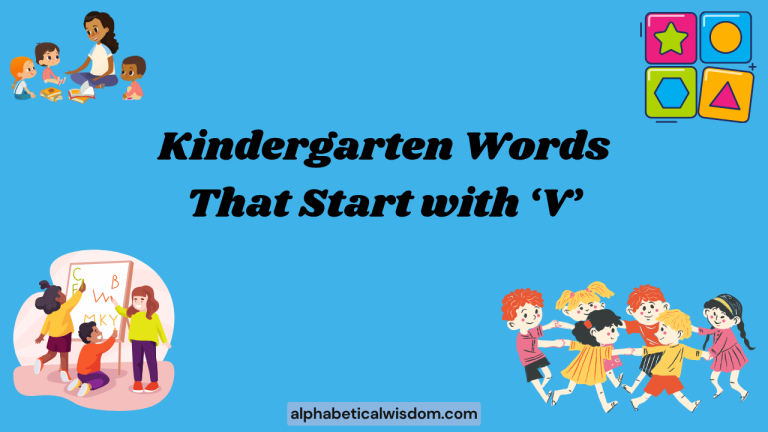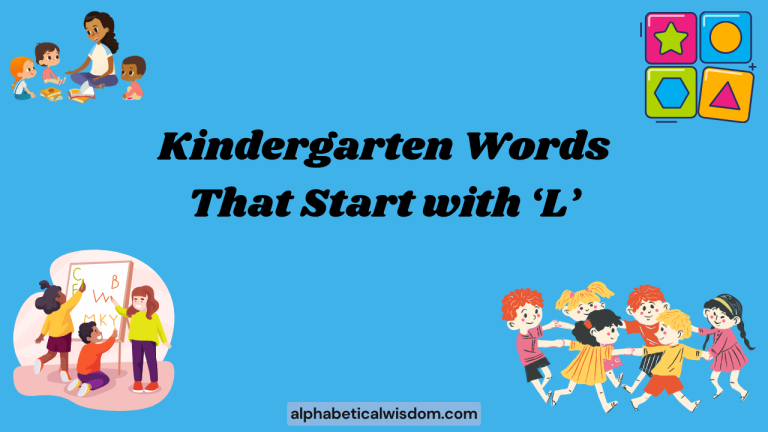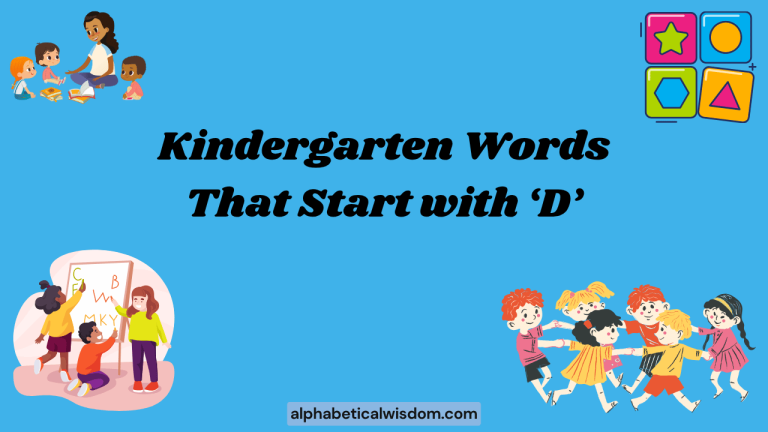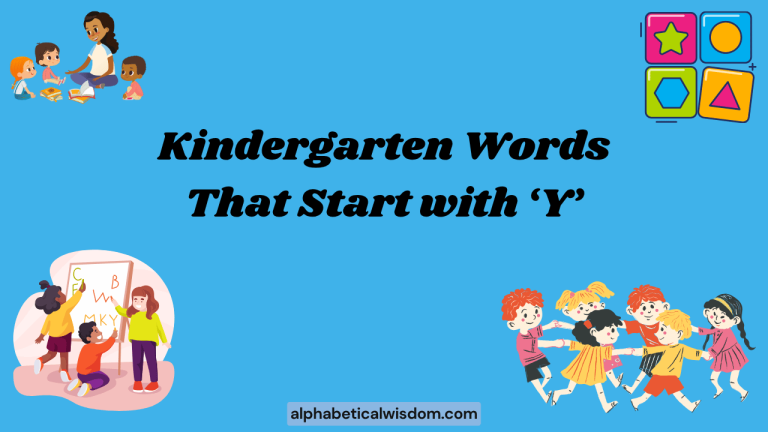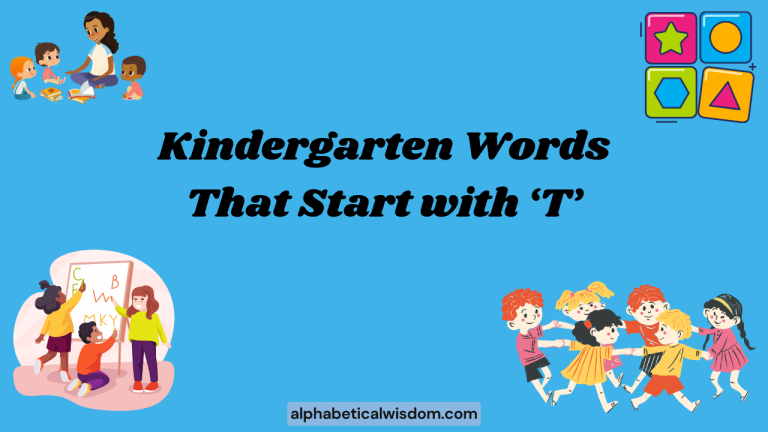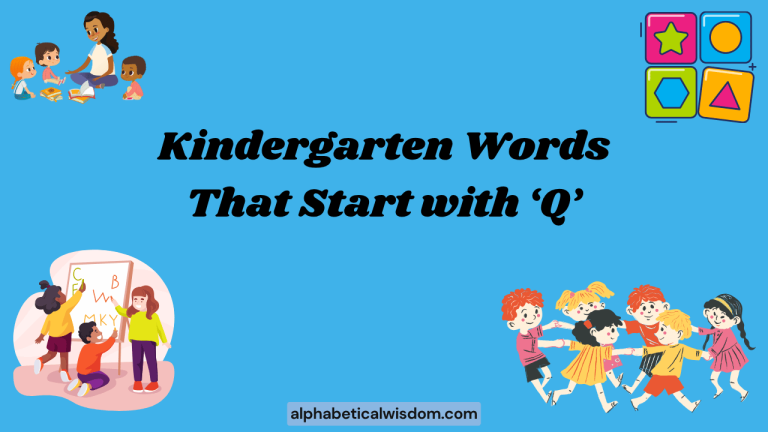Kindergarten Words Starting With R: A Comprehensive Guide
Learning new words is a crucial part of a child’s development, especially in kindergarten. Words starting with the letter ‘R’ are particularly interesting, as they introduce a variety of sounds and concepts.
This guide aims to provide a comprehensive overview of kindergarten-appropriate words that begin with ‘R,’ helping children expand their vocabulary and improve their language skills. This article is designed for parents, teachers, and anyone involved in early childhood education, offering clear explanations, examples, and practice exercises to make learning fun and effective.
By mastering these words, children build a strong foundation for reading, writing, and overall communication.
Table of Contents
- Introduction
- Definition of Kindergarten Words Starting With R
- Structural Breakdown of Words Starting With R
- Types and Categories of ‘R’ Words for Kindergarten
- Examples of Kindergarten Words Starting With R
- Usage Rules for Words Starting With R
- Common Mistakes When Using ‘R’ Words
- Practice Exercises
- Advanced Topics: Exploring Complex ‘R’ Words
- Frequently Asked Questions (FAQ)
- Conclusion
Definition of Kindergarten Words Starting With R
Kindergarten words starting with ‘R’ are words that are appropriate for children aged 4-6 years old and begin with the letter ‘R.’ These words are typically simple, easy to pronounce, and related to common objects, actions, or concepts that children encounter in their daily lives. The primary function of introducing these words is to expand a child’s vocabulary, improve their phonemic awareness (the ability to hear and manipulate sounds in words), and lay a foundation for reading and writing skills.
These words often appear in children’s books, educational games, and classroom activities.
These words serve multiple functions. They help children understand the relationship between letters and sounds (phonics).
They also aid in developing early literacy skills, such as recognizing letters, blending sounds to form words, and understanding the meaning of words in context. Furthermore, learning ‘R’ words can boost a child’s confidence in their ability to communicate effectively.
The context in which these words are used is also important. Kindergarten words starting with ‘R’ are often introduced through interactive activities, such as reading aloud, singing songs, playing word games, and engaging in hands-on learning experiences.
These activities help children to associate the words with real-world objects and actions, making the learning process more meaningful and memorable. For instance, a child might learn the word “red” while playing with red blocks or reading a book about a red car.
Structural Breakdown of Words Starting With R
The structure of words starting with ‘R’ can vary, but many kindergarten-level words follow simple phonetic patterns. Understanding these patterns can help children decode and pronounce new words more easily.
Here’s a breakdown of common structural elements:
Consonant-Vowel (CV) Pattern: Many simple ‘R’ words follow the CV pattern, where the letter ‘R’ is followed by a vowel. Examples include: “re” (as in “redo”), “ro” (as in “robot”), and “ru” (as in “rug”).
Consonant-Vowel-Consonant (CVC) Pattern: This is another common pattern where ‘R’ is followed by a vowel and then a consonant. Examples include: “rat,” “red,” “rip,” “rob,” and “run.”
Consonant Blends: Some ‘R’ words start with consonant blends, where ‘R’ is combined with another consonant, such as ‘br’ (as in “brown”), ‘cr’ (as in “crab”), ‘dr’ (as in “drum”), ‘fr’ (as in “frog”), ‘gr’ (as in “grape”), ‘pr’ (as in “present”), and ‘tr’ (as in “tree”). Understanding these blends is crucial for pronunciation.
Digraphs: While less common at the kindergarten level, some words might introduce digraphs, where two letters combine to make one sound. An example related to ‘R’ could be ‘wr’ (as in “write”), although the ‘w’ is silent.
Understanding these structural patterns helps children to break down words into smaller parts and recognize common sound-letter correspondences. This, in turn, improves their reading fluency and comprehension.
Teachers often use phonics-based instruction to explicitly teach these patterns, providing children with opportunities to practice blending sounds and segmenting words.
Types and Categories of ‘R’ Words for Kindergarten
To make learning more organized and engaging, ‘R’ words can be categorized into different groups based on their meaning and usage. Here are some common categories:
Animals
This category includes names of animals that start with the letter ‘R.’ Learning about animals is a favorite topic for many kindergarteners, making this category a great way to introduce new vocabulary.
Objects
This category includes names of common objects that children encounter in their daily lives. These words help children to identify and describe the world around them.
Actions
This category includes verbs that start with the letter ‘R.’ Action words help children to understand and describe different activities and movements.
Descriptive Words
This category includes adjectives that start with the letter ‘R.’ Descriptive words help children to add detail and color to their language, making their communication more vivid and engaging.
Examples of Kindergarten Words Starting With R
Here are some examples of kindergarten words starting with ‘R,’ organized by category:
Animal Examples
The following table provides examples of animals that start with the letter ‘R’ suitable for kindergarten-level learning. These examples are chosen to be familiar and interesting to young children, aiding in vocabulary acquisition and engagement.
| Word | Description | Example Sentence |
|---|---|---|
| Rabbit | A small mammal with long ears and a fluffy tail. | The rabbit hopped across the yard. |
| Rat | A rodent with a long tail. | The rat scurried under the house. |
| Robin | A small bird with a red breast. | The robin sang in the tree. |
| Rhino | A large mammal with a horn on its nose. | The rhino is a very big animal. |
| Reindeer | A type of deer with large antlers, often associated with Christmas. | Reindeer pull Santa’s sleigh. |
| Ram | A male sheep. | The ram has big, curved horns. |
| Raccoon | A nocturnal mammal with a striped tail and a mask-like face. | The raccoon washed its food in the stream. |
| Reptile | A cold-blooded animal with scales. | A snake is a type of reptile. |
| Roach | A cockroach. | There was a roach in the kitchen. |
| Rusty Crayfish | A crayfish with a rusty color. | The Rusty Crayfish crawled along the riverbed. |
| Ray | A fish with a flat body and long tail. | The ray swam gracefully in the ocean. |
| River Otter | An otter that lives in rivers. | The River Otter played in the water. |
| Red Panda | A small panda with reddish-brown fur. | The Red Panda ate bamboo leaves. |
| Rockfish | A fish that lives near rocks. | The Rockfish hid among the rocks. |
| Roadrunner | A fast-running bird. | The Roadrunner ran across the desert. |
| Redfish | A fish with red color. | The fisherman caught a Redfish. |
| Rooster | A male chicken. | The rooster crows in the morning. |
| Ringworm | A skin disease caused by a fungus. | The cat had a Ringworm. |
| Raven | A large black bird. | The Raven flew high in the sky. |
| Rattlesnake | A venomous snake with a rattle on its tail. | The Rattlesnake shook its tail to warn us. |
| Red Squirrel | A squirrel with red fur. | The Red Squirrel scampered up the tree. |
| Rough Green Snake | A snake with green color. | The Rough Green Snake slithered through the grass. |
| Rainbow Trout | A trout with rainbow color. | The Rainbow Trout jumped out of the water. |
| Red-Eyed Tree Frog | A frog with red eyes. | The Red-Eyed Tree Frog sat on a leaf. |
Object Examples
The following table provides examples of objects that start with the letter ‘R’ suitable for kindergarten-level learning. These objects are common and relatable to young children, aiding in vocabulary acquisition and comprehension.
| Word | Description | Example Sentence |
|---|---|---|
| Ring | A circular band worn on a finger. | She wore a beautiful ring. |
| Road | A paved surface for vehicles to travel on. | We drove down the road. |
| Rose | A type of flower with a sweet scent. | The rose is red and smells nice. |
| Rope | A thick cord made of twisted strands. | The sailor used a rope to tie the boat. |
| Rock | A solid mineral material forming part of the Earth’s surface. | I found a smooth rock on the beach. |
| Room | A space within a building. | This room is very tidy. |
| Roof | The covering of a building. | The roof protects us from the rain. |
| Radio | A device that receives audio signals. | We listened to music on the radio. |
| Ribbon | A narrow strip of fabric used for tying or decoration. | She tied a ribbon in her hair. |
| River | A large natural stream of water flowing in a channel to the sea, a lake, or another such stream. | The river flows through the valley. |
| Robot | A machine capable of carrying out a complex series of actions automatically. | The robot can walk and talk. |
| Ruler | A tool used for measuring length. | I used a ruler to draw a straight line. |
| Rug | A floor covering made of thick woven material. | The rug is soft and warm. |
| Raisin | A dried grape. | I like to eat raisins as a snack. |
| Raspberry | A red berry. | The raspberry is sweet and juicy. |
| Record | A vinyl disc storing recorded sound. | My grandma has a collection of records. |
| Recipe | A set of instructions for preparing a particular dish. | I followed the recipe to bake a cake. |
| Reflector | A piece of reflective material used to reflect light. | The bicycle has a reflector on the back. |
| Remote | A device used to control something from a distance. | I used the remote to change the channel. |
| Restaurant | A place where meals are served to the public. | We went to a restaurant for dinner. |
| Riddle | A question or statement intentionally phrased so as to require ingenuity in ascertaining its answer or meaning. | He asked me a tricky riddle. |
| Rucksack | A backpack. | I packed my rucksack for the hike. |
| Rutabaga | A root vegetable. | We had rutabaga with dinner. |
Action Examples
The following table provides examples of action words (verbs) that start with the letter ‘R’ suitable for kindergarten-level learning. These verbs are common and easy to understand, assisting in vocabulary expansion and comprehension of actions.
| Word | Description | Example Sentence |
|---|---|---|
| Run | To move at a speed faster than a walk. | I like to run in the park. |
| Read | To look at and understand the meaning of written or printed matter. | I read a book before bedtime. |
| Ride | To sit on and control the movement of a horse, bicycle, motorcycle, etc. | I ride my bike to school. |
| Reach | To extend one’s hand or arm in a specified direction in order to touch or grasp something. | I can reach the top shelf. |
| Rest | To cease work or movement in order to relax, refresh oneself, or recover strength. | I need to rest after playing. |
| Rub | To move one’s hand or something else back and forth on a surface with pressure. | I rub my eyes when I’m tired. |
| Roar | To make a loud, deep sound. | The lion roared loudly. |
| Rise | To get up from a lying or sitting position. | I rise early in the morning. |
| Rake | To smooth or clear a surface with a rake. | I rake the leaves in the fall. |
| Rattle | To make or cause to make a rapid succession of short knocking sounds. | The baby’s toy rattled. |
| React | To respond to something. | I react to loud noises. |
| Recognize | To identify someone or something known from previous encounter or knowledge. | I recognize my friend in the crowd. |
| Reduce | To make smaller or less in amount, degree, or size. | I reduce the amount of sugar in my tea. |
| Refill | To fill something again. | I need to refill my water bottle. |
| Reflect | To throw back light or sound. | The mirror reflects my image. |
| Reject | To refuse to accept. | I reject the offer. |
| Relax | To make or become less tense or anxious. | I relax by listening to music. |
| Release | To allow or enable to escape from confinement. | I release the bird from its cage. |
| Remember | To have in or be able to bring to one’s mind an awareness of someone or something that one has known or experienced in the past. | I remember my first day of school. |
| Repair | To restore something damaged, faulty, or worn to a good condition. | I will repair my broken toy. |
| Repeat | To say something again. | I will repeat the question. |
| Report | To give a spoken or written account of something that one has observed, heard, done, or investigated. | I report the incident to the teacher. |
| Rescue | To save someone or something from a dangerous or difficult situation. | I rescue the cat from the tree. |
Descriptive Examples
The following table provides examples of descriptive words (adjectives) that start with the letter ‘R’ suitable for kindergarten-level learning. These adjectives are simple and easy to understand, aiding in vocabulary expansion and descriptive language skills.
| Word | Description | Example Sentence |
|---|---|---|
| Red | Having a color like that of blood. | The apple is red. |
| Round | Having a circular shape. | The ball is round. |
| Ready | Prepared for something. | I am ready for school. |
| Real | Actually existing or occurring; not imagined or false. | This is a real diamond. |
| Rich | Having a great deal of money or assets; wealthy. | The rich man lives in a big house. |
| Right | Morally good, justified, or acceptable. | It is right to be kind. |
| Rapid | Happening very quickly. | The car was very rapid. |
| Rare | Not occurring very often. | A blue moon is rare. |
| Raw | Not cooked. | I don’t eat raw fish. |
| Reasonable | Fair and sensible. | The price is reasonable. |
| Receptive | Willing to consider or accept new suggestions and ideas. | I am receptive to learning new things. |
| Recorded | Preserved on tape, disc, or film. | The song is recorded. |
| Rectangular | Shaped like a rectangle. | The table is rectangular. |
| Refined | With impurities or unwanted elements having been removed by processing. | The sugar is refined. |
| Refreshing | Pleasantly cool and invigorating. | The drink is refreshing. |
| Regular | Arranged in or constituting a constant or definite pattern, especially with the same space between individual instances. | The bus is regular. |
| Reliable | Consistently good in quality or performance; able to be trusted. | The car is reliable. |
| Remarkable | Worthy of attention; striking. | The performance was remarkable. |
| Remote | Situated far from the main centers of population; distant. | The island is remote. |
| Renowned | Known or talked about by many people; famous. | The chef is renowned. |
| Repaired | Restored to a good condition. | The car is repaired. |
| Repetitive | Containing or characterized by repetition, especially when unnecessary or unwanted. | The task is repetitive. |
| Resilient | Able to withstand or recover quickly from difficult conditions. | The plant is resilient. |
Usage Rules for Words Starting With R
Using ‘R’ words correctly involves understanding basic grammar rules and pronunciation. Here are some key usage rules:
Subject-Verb Agreement: Ensure the verb agrees with the subject. For example, “The rabbit runs” (singular) vs. “The rabbits run” (plural).
Proper Nouns: Remember to capitalize proper nouns that start with ‘R,’ such as names of people (e.g., “Robert”), places (e.g., “Rome”), or holidays (e.g., “Ramadan”).
Tense Consistency: Maintain consistent verb tense. For example, “Yesterday, I read a book” (past tense) vs. “Today, I read a book” (present tense).
Articles: Use articles (a, an, the) correctly. For example, “a rabbit” (general) vs. “the rabbit” (specific).
Pronunciation: Pay attention to the pronunciation of ‘R’ sounds, especially in consonant blends. Practice saying words like “brown,” “crab,” and “tree” to improve clarity.
Contextual Usage: Choose words that are appropriate for the context. For example, use “road” when talking about a paved surface for vehicles and “route” when referring to a course or direction.
Plural Forms: Most ‘R’ words form plurals by adding ‘s’ (e.g., “rings,” “rocks”). However, some words have irregular plural forms (though these are less common at the kindergarten level).
Common Mistakes When Using ‘R’ Words
Even native English speakers sometimes make mistakes when using ‘R’ words. Here are some common errors to watch out for:
Mispronunciation: Confusing similar-sounding words (e.g., “read” vs. “red”). Practice pronunciation to differentiate these words.
Incorrect Plurals: Adding ‘s’ to words that have irregular plural forms (though, as mentioned, these are less common at the kindergarten level). Double-check the plural form if unsure.
Wrong Tense: Using the wrong verb tense (e.g., “I runned” instead of “I ran”). Pay attention to the past tense forms of irregular verbs.
Article Errors: Using the wrong article (e.g., “a rose” instead of “an rose” – note the correct usage depends on the following sound, not the letter). Remember to use “an” before words that start with a vowel sound.
Confusion with Similar Words: Mixing up words with similar meanings but different usages (e.g., “road” vs. “route”). Understand the specific meaning of each word.
Here’s a table illustrating some common mistakes and their corrections:
| Incorrect | Correct | Explanation |
|---|---|---|
| I runned to the store. | I ran to the store. | “Ran” is the past tense of “run.” |
| The rabbits eats grass. | The rabbits eat grass. | “Eat” agrees with the plural subject “rabbits.” |
| A rose are red. | A rose is red. | “Is” agrees with the singular subject “rose.” |
| I see a road. | Correct | No error in the sentence. |
| Road is long. | The road is long. | The article “the” is used when referring to a specific road. |
Practice Exercises
Here are some practice exercises to help reinforce learning of ‘R’ words:
Exercise 1: Fill in the Blanks
Complete the following sentences with the correct ‘R’ word from the word bank.
| Question | Answer |
|---|---|
| The ___________ hopped across the field. (rabbit, rock, run) | rabbit |
| I like to ___________ my bike in the park. (ride, ring, read) | ride |
| The ___________ is red and smells sweet. (rose, rope, room) | rose |
| The ___________ protects us from the rain. (roof, rock, road) | roof |
| I can ___________ the top shelf. (reach, rest, rub) | reach |
| The ___________ roared loudly. (rat, ram, roar) | roar |
| I used a ___________ to draw a straight line. (ruler, rug, raisin) | ruler |
| We went to a ___________ for dinner. (restaurant, remote, recipe) | restaurant |
| The apple is __________. (red, round, ready) | red |
| The car is very __________. (rapid, raw, rare) | rapid |
Exercise 2: Matching
Match the ‘R’ word with its correct definition.
| Word | Definition | Answer |
|---|---|---|
| 1. Run | a. A small mammal with long ears | 1-c |
| 2. Rabbit | b. To look at and understand written words | 2-a |
| 3. Read | c. To move at a speed faster than a walk | 3-b |
| 4. Ring | d. A circular band worn on a finger | 4-e |
| 5. Road | e. A paved surface for vehicles | 5-d |
| 6. Rose | f. A type of flower | 6-f |
| 7. Rock | g. To stop working to relax | 7-i |
| 8. Roof | h. Preserved on tape, disc, or film | 8-j |
| 9. Rest | i. A solid mineral material | 9-g |
| 10. Recorded | j. The covering of a building | 10-h |
Exercise 3: Sentence Completion
Complete the sentences using the ‘R’ word that makes the most sense. Choose from the options provided.
| Question | Answer |
|---|---|
| I __________ a story to my little sister. (read, red, ride) | read |
| The __________ is a big animal with a horn on its nose. (rhino, robin, rat) | rhino |
| He tied the package with a ___________. (rose, rope, road) | rope |
| The ___________ is round and hard. (rock, room, rug) | rock |
| I need to __________ after playing outside. (rest, rub, reach) | rest |
| The color of the apple is ___________. (red, read, ride) | red |
| I can __________ my friend in the crowd. (recognize, reduce, reflect) | recognize |
| The bus is __________. (regular, reliable, remote) | regular |
| The performance was ___________. (remarkable, remote, recorded) | remarkable |
| The chef is ___________. (renowed, repaired, repetitive) | renowned |
Advanced Topics: Exploring Complex ‘R’ Words
For advanced learners, exploring more complex ‘R’ words can be beneficial. This includes understanding words with multiple syllables, less common vocabulary, and nuanced meanings.
For example, words like “responsibility,” “rhetoric,” and “ramifications” introduce more sophisticated concepts and language structures. Additionally, exploring idioms and expressions that use ‘R’ words, such as “raining cats and dogs” or “rule of thumb,” can further enhance language proficiency.
Teachers can also introduce compound words that start with ‘R,’ such as “railroad” or “rainbow,” to expand vocabulary and understanding of word formation.
These advanced topics can be integrated into lessons through reading more challenging texts, engaging in discussions about complex ideas, and practicing writing more detailed sentences and paragraphs. Encouraging students to use a thesaurus to find synonyms for ‘R’ words can also help them to expand their vocabulary and improve their ability to express themselves effectively.
Frequently Asked Questions (FAQ)
Here are some frequently asked questions about kindergarten words starting with ‘R’:
- What are some easy ‘R’ words for kindergarteners to learn?
Easy ‘R’ words include “red,” “run,” “read,” “rose,” “ring,” “rabbit,” and “rock.” These words are simple to pronounce and relate to common objects or actions.
- How can I make learning ‘R’ words fun for my child?
Make learning fun by using games, songs, and interactive activities. For example, play “I Spy” with ‘R’ words, sing songs that include ‘R’ words, or read books together that feature ‘R’ words prominently.
- What is phonemic awareness, and why is it important for learning ‘R’ words?
Phonemic awareness is the ability to hear and manipulate sounds in words. It’s important because it helps children
hear the ‘R’ sound at the beginning of words and understand how it relates to the letter ‘R.’ This skill is crucial for reading and spelling.
- Are there any ‘R’ words that are commonly confused?
Yes, some commonly confused ‘R’ words include “read” and “red,” “road” and “rode,” and “right” and “write.” Practicing pronunciation and understanding the context in which these words are used can help to avoid confusion.
- How can I help my child practice using ‘R’ words in sentences?
Encourage your child to create their own sentences using ‘R’ words. Provide prompts or pictures to help them get started. You can also play sentence-building games where you start a sentence with an ‘R’ word, and your child adds to it.
- What are some good books for kindergarteners that feature ‘R’ words?
Some good books include “Run, Run, Run!” by April Pulley Sayre, “The Tale of Peter Rabbit” by Beatrix Potter, and any book that focuses on colors, animals, or simple actions.
- How do I teach my child about consonant blends with ‘R’?
Introduce consonant blends by breaking down the sounds in words like “brown,” “crab,” and “tree.” Use visual aids, such as flashcards or charts, to help children see and hear the blends. Practice blending the sounds together slowly and repeatedly.
Conclusion
Mastering kindergarten words starting with ‘R’ is a significant step in a child’s literacy journey. By understanding the definition, structure, and usage of these words, children can build a strong foundation for reading, writing, and overall communication skills.
This guide has provided a comprehensive overview of ‘R’ words, including examples, usage rules, common mistakes, and practice exercises. By incorporating these strategies into your teaching or parenting approach, you can help children develop a rich vocabulary and a love for language.
Remember to make learning fun, engaging, and relevant to their everyday experiences. With consistent practice and encouragement, children will confidently use ‘R’ words and continue to expand their linguistic abilities.
